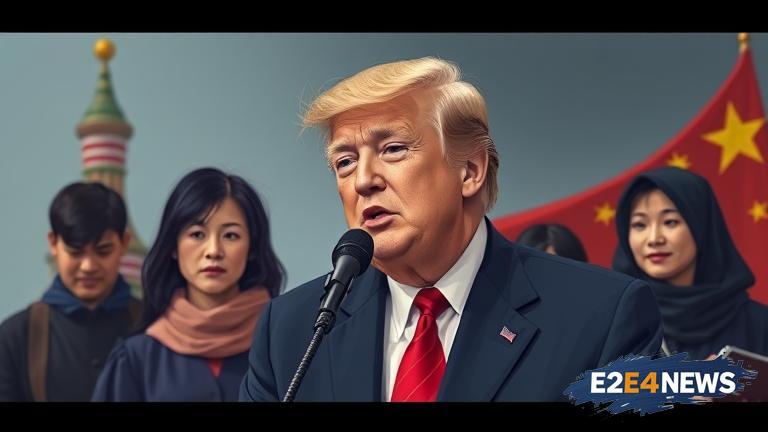The Trump administration’s recent decision to restrict visas for Chinese students has sent shockwaves throughout the academic and diplomatic communities. The move, which aims to prevent the theft of intellectual property and protect national security, has been met with widespread criticism and concerns over the potential consequences for US-China relations and the future of international education. The restrictions, which limit the duration of visas for Chinese students studying in fields such as robotics, aviation, and advanced manufacturing, have been seen as a significant escalation of the ongoing trade tensions between the two nations. Many have argued that the move is overly broad and will unfairly target innocent students, while others have expressed concerns over the potential impact on the US economy and the country’s ability to attract top talent from around the world. The decision has also been criticized for its potential to undermine the principles of academic freedom and exchange, which are essential to the advancement of knowledge and innovation. Furthermore, the restrictions have been seen as a significant setback for the thousands of Chinese students who come to the US each year to pursue higher education, and who contribute significantly to the country’s academic and cultural diversity. The move has also been criticized for its potential to damage the reputation of US universities and research institutions, which have long been seen as among the best in the world. In addition, the restrictions have raised concerns over the potential for retaliation from the Chinese government, which could have significant implications for US businesses and citizens living and working in China. The decision has also been seen as a reflection of the growing tensions between the US and China, which have been fueled by a range of issues including trade, security, and human rights. Many have argued that the move is a misguided attempt to address the complex issues surrounding intellectual property theft and national security, and that it will ultimately do more harm than good. The restrictions have also been criticized for their potential to undermine the progress that has been made in recent years in promoting people-to-people exchanges and educational cooperation between the US and China. Despite the criticism, the Trump administration has defended the decision, arguing that it is necessary to protect US interests and prevent the theft of sensitive technology. However, many experts have questioned the effectiveness of the restrictions, arguing that they will do little to address the underlying issues and will instead create a range of unintended consequences. The decision has also been seen as a significant challenge to the international community, which has long recognized the importance of academic freedom and exchange in promoting peace, understanding, and cooperation. In response to the restrictions, many universities and research institutions have spoken out against the decision, arguing that it will undermine their ability to attract top talent and conduct cutting-edge research. The restrictions have also been criticized by a range of business and industry groups, which have argued that they will damage the US economy and undermine the country’s competitiveness. The decision has also raised concerns over the potential impact on the US’s ability to address global challenges such as climate change, pandemics, and economic inequality, which require international cooperation and collaboration. Overall, the Trump administration’s decision to restrict visas for Chinese students has sparked widespread criticism and concerns over the impact on US-China relations, international education, and the future of academic freedom and exchange. The move has been seen as a significant escalation of the ongoing trade tensions between the US and China, and has raised concerns over the potential consequences for the US economy, national security, and the country’s reputation as a global leader in higher education. As the situation continues to unfold, it remains to be seen how the restrictions will be implemented and what the long-term consequences will be for US-China relations, international education, and the future of academic freedom and exchange.
